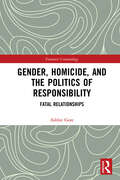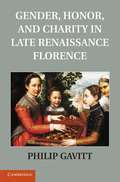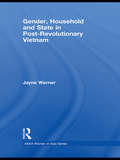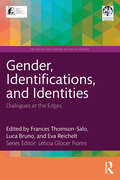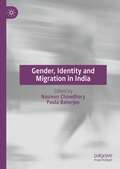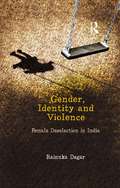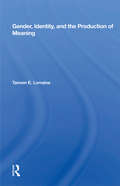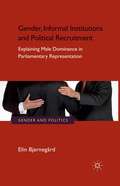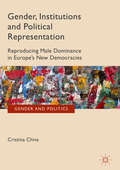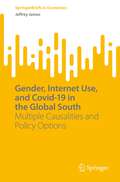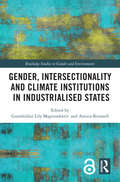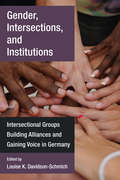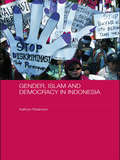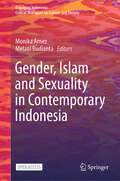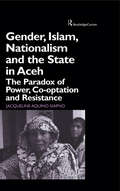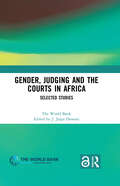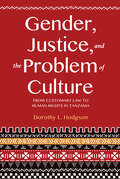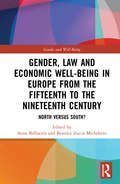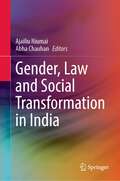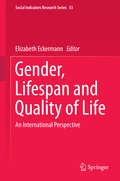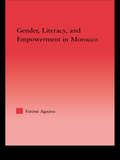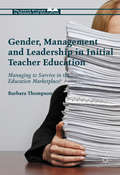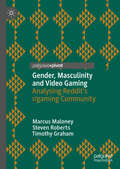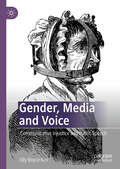- Table View
- List View
Gender, Homicide, and the Politics of Responsibility: Fatal Relationships (Feminist Criminology)
by Ashlee GoreGender, Homicide, and the Politics of Responsibility explores the competing and contradictory understandings of violence against women and men’s responsibility. It situates these within the personal and political intersections of neoliberal and ‘postfeminist’ imperatives of individualisation, choice, and empowerment. As violence against women has become a national and international policy priority, feminist concerns about violence against women, and men’s responsibility, have entered the mainstream only to be articulated in politically contradictory ways. This book explores themes of responsibility for violence, and the social and legal consequences that men and women uniquely or differently encounter. By drawing on high-profile cases of homicide, an extensive literature on feminist perspectives on violence, and compelling focus group discussions, the book examines the politicised claims regarding the ‘responsibility’ of men and women as both victims and offenders in intimate relationships. Deploying a range of interdisciplinary approaches, it utilises a blend of cultural theory and psychosocial analysis to offer an account of the infiltration of postfeminist and neoliberal sensibilities of individualism and responsibilisation in the social, legal, and interpersonal imaginary. The book makes contributions to several fields, such as the current public policy initiatives to hold men accountable for violence against women; understanding public attitudes to violence against women; and contextualising the challenges faced by a number of feminist reforms that seek to address these issues. An accessible and compelling read, Gender, Homicide, and the Politics of Responsibility will appeal to students and scholars of criminology, sociology, gender studies and those interested in understanding the debates surrounding violence against women, violence by women, and the social construction of responsibility and responsibilisation.
Gender, Honor, and Charity in Late Renaissance Florence
by Philip GavittThis book examines the important social role of charitable institutions for women and children in late Renaissance Florence. Wars, social unrest, disease and growing economic inequality on the Italian peninsula displaced hundreds of thousands of families during this period. In order to handle the social crises generated by war, competition for social position and the abandonment of children, a series of private and public initiatives expanded existing charitable institutions and founded new ones. Philip Gavitt's research reveals the important role played by lineage ideology among Florence's elites in the use and manipulation of these charitable institutions in the often futile pursuit of economic and social stability. Considering families of all social levels, he argues that the pursuit of family wealth and prestige often worked at cross-purposes with the survival of the very families it was supposed to preserve.
Gender, Household and State in Post-Revolutionary Vietnam (ASAA Women in Asia Series)
by Jayne WernerThis book examines gender in post-revolutionary Vietnam, focusing on gender relations in the family and state since the onset of economic reform in 1986. Drawing on a wide range of primary sources (including surveys, interviews, and responses to film screenings), Jayne Werner demonstrates that despite the formal institution of public gender equality in Vietnam, in practice women do not hold a great deal of power, continuing to defer to men in both the family and the wider community. Contrary to conventional analyses equating liberalisation and decentralisation with a reduced role for the state over social relations, this book argues that gender relations continued to bear the imprint of state gender policies and discourses in the post-socialist state. While the household remained a highly statist sphere, the book also shows that the unequal status of men and women in the family was based on kinship ties that provided the underlying structure of the family and (contrary to resource theory) depended less on their economic contribution than on family norms and conceptions of proper gendered behaviour. Werner’s analysis explores the ways in which the Doi Moi state utilised constructions of gender to advance its own interests, just as the communist revolutionary regime had earlier used gender as a key strategic component of post-colonial government. Thus this book makes an important and original contribution to the study of gender in post-socialist countries.
Gender, Identifications, and Identities: Dialogues at the Edges (IPA Sexual and Gender Diversity Studies)
by Luca Bruno Eva ReicheltGender, Identifications, and Identities considers the increasing visibility of sexual and gender diversity and reflects on how this is felt within psychoanalysis.The international contributors focus on identifications, gender, and identity, including gender and sexuality in psychic development, as well as the link between identifications, body, and gender. The book also considers how gender fluidity can be a challenge for approaching the coexistence of different states of the self, as well as transference-countertransference experiences and implications, working through and implications for theory and technique. It offers an opportunity to air conflicting psychoanalytic views and rethink established concepts.Gender, Identifications, and Identities will be key reading for psychoanalysts and psychotherapists in practice and in training. It will also be of interest to academics of psychoanalytic studies and gender studies.
Gender, Identity and Migration in India
by Nasreen Chowdhory Paula BanerjeeThe book focuses on voices of displaced women who constitute a critical part of the migration process through an unravelling of the engendered displacement. It draws attention to the various processes, methods and approaches by national and international human rights and humanitarian laws and principles, and the experiences of the relevant communities, organisations towards peaceful co-existence. The contributions to this volume embellish the argument that there is a direct correlation between an academic researcher's positionality, methods and trajectories of critical knowledge production. In particular, feminist epistemologies with specific emphasis on post-coloniality utilized in conjunction with scholarship related to transnational migration studies constitute a distinctly powerful vantage point for challenging methodological nationalism and the syndrome of 'seeing like the state' in the area of forced migration studies.
Gender, Identity and Violence: Female Deselection in India
by Rainuka DagarThe missing girls in India are not a new phenomenon. The British passed an Act to check female infanticide more than 100 years ago. Since 1960, India’s birth sex ratios have progressively declined from 994 to 910, implicating life-affecting gender violence. Backed by extensive field research, data and interviews, this book explores girl child deselection through cultural neglect, female infanticide and foeticide, and the role of caste and religion. The book spans critical socio-historical contexts and examines the practice of selective right to life. It views the effects of militancy and khaap panchayats, and studies women’s rights discourses and protective legal reforms. The gender imbalance is mapped globally and analysed in the specific conditions of the Indian states of Punjab and Haryana. The book examines the inter-linkages of gender hierarchies with male child preference and warns that theoretical analyses limited to female foeticide alone cannot address gender inequalities or change the cycle of violence. This will be valuable to scholars and researchers of gender and women studies, sociology, politics, and population and demographic studies. It will also be indispensable for women’s rights activists, NGOs, policy makers, government bodies, and those studying health and family planning.
Gender, Identity, And The Production Of Meaning
by Tamsin E. LorraineThis book explains an open-ended theory of self that delineates 'masculine' and 'feminine' self-strategies on the basis of the Hegelian tradition of theorizing self/other relations and contemporary feminist theory. It proposes the possibility of combining the gender differentiated self strategies.
Gender, Informal Institutions and Political Recruitment
by Elin Bjarneg�rdIn this book, men in politics are the subjects of a gendered analysis with Elin Bjarnegård exploring how male networks are maintained and expanded, seeking to improve our understanding of the rationale underlying male dominance in politics. The role of informal institutions in unpredictable political settings are explored.
Gender, Institutions and Political Representation
by Cristina ChivaThis book traces the struggles over the institutions of political representation in Central and Eastern Europe, focusing on the factors that have held women back over the post-communist period, as well as on the growing evidence for change throughout the region. Post-communist Europe has long raised two puzzles for scholars of women's representation in politics. First, why have women been under-represented in politics in every country in the region since communism's collapse? Secondly, why are there relatively few cases where women's advocates have been successful in pressing for change? This comparative study of Europe's new democracies argues that these puzzles are best understood as questions about male dominance - that is, about the mechanisms that sustain, or, alternatively, change long-established patterns of male over-representation in politics over time. The author covers six EU member states - Bulgaria, the Czech Republic, Hungary, Poland, Romania and Slovakia - during the period 1990-2016. The book will be of use to students and scholars in the fields of Comparative Politics, Democracy and Democratization, European Studies, Gender Studies, Post-Communist Studies, and Central and Eastern European Studies.
Gender, Internet Use, and Covid-19 in the Global South: Multiple Causalities and Policy Options (SpringerBriefs in Economics)
by Jeffrey JamesThis book analyzes the use of the mobile Internet against the background of gender bias and Covid-19, currently two of the most important and pressing problems of the Global South. The book argues that the degree of benefits from this new technology depends heavily on the way it is actually used and that most new technologies are developed for the conditions prevailing in rich countries, where they tend to be quite easily adopted and used. In the Global South, by contrast, a paucity of digital skills and other factors make the potentially valuable benefits from the Internet much more difficult to derive. Using empirical data recently provided by the Groupe Speciale Mobile Association (GSMA), the book examines the existence and extent of the digital divide between males and females in mobile Internet use, which constitutes a new form of divide. It sheds light on the acute difficulty for first-time mobile Internet users in the Global South, and especially Sub-Saharan Africa, to learn the digital skills that are needed to use the said technology effectively, with a special focus on how these users acquire the required knowledge, without having undergone the process of learning by doing. The book further discusses the determinants of digital skills in the Global South, as well as major factors underlying the extent to which different users actually benefit from the mobile Internet, such as gender, location, age, and education. Finally, it investigates how womens' use of the Internet has been altered by the pandemic in the Global South.This book will appeal to students, researchers, and scholars of development economics and development studies, as well as policy-makers interested in a better understanding of the impact of gender bias and Covid-19 on mobile internet use in the Global South.
Gender, Intersectionality and Climate Institutions in Industrialised States (Routledge Studies in Gender and Environments)
by Gunnhildur Lily Magnusdottir and Annica KronsellThis book explores how climate institutions in industrialized countries work to further the recognition of social differences and integrate this understanding in climate policy making. With contributions from a range of expert scholars in the field, this volume investigates policy-making in climate institutions from the perspective of power as it relates to gender. It also considers other intersecting social factors at different levels of governance, from the global to the local level and extending into climate-relevant sectors. The authors argue that a focus on climate institutions is important since they not only develop strategies and policies, they also (re)produce power relations, promote specific norms and values, and distribute resources. The chapters throughout draw on examples from various institutions including national ministries, transport and waste management authorities, and local authorities, as well as the European Union and the UNFCCC regime. Overall, this book demonstrates how feminist institutionalist theory and intersectionality approaches can contribute to an increased understanding of power relations and social differences in climate policy-making and in climate-relevant sectors in industrialized states. In doing so, it highlights the challenges of path dependencies, but also reveals opportunities for advancing gender equality, equity, and social justice. Gender, Intersectionality and Climate Institutions in Industrialized States will be of great interest to students and scholars of climate politics, international relations, gender studies and policy studies.
Gender, Intersections, and Institutions: Intersectional Groups Building Alliances and Gaining Voice in Germany
by Louise K Davidson-SchmichGermany serves as a case study of when and how members of intersectional groups—individuals belonging to two or more disadvantaged social categories—capture the attention of policymakers, and what happens when they do. This edited volume identifies three venues through which intersectional groups are able to form alliances and generate policy discussions regarding their concerns. Original empirical case studies focus on a wide range of timely subjects, including the intersexed, gender and disability rights, lesbian parenting, women working in STEM fields, workers’ rights in feminized sectors, women in combat, and Muslim women and girls.
Gender, Islam and Democracy in Indonesia (ASAA Women in Asia Series #6)
by Kathryn RobinsonThis book explores the relationship between gender, religion and political action in Indonesia, examining the patterns of gender orders that have prevailed in recent history, and demonstrating the different forms of social power this has afforded to women. It sets out the part played by women in the nationalist movement, and the role of the women’s movement in the structuring of the independent Indonesian state, the politics of the immediate post-independence period and the transition to the authoritarian New Order. It analyses in detail the gender relations of the New Order regime, focused around the unitary family form supposed by the family system expounded in the New Order ideology and the contradictory implications of the opening up of the economy to foreign capital and ideas, for gender relations. It examines the forms of political activism that were possible for the women’s movement under the New Order, and the role it played in the fall of Suharto and the transition to democracy. The relationship between Islam and women in Indonesia is also addressed, with particular focus on the way in which Islam became a critical focus for political dissent in the late New Order period. Overall, this book provides a thorough investigation of the relationship between gender, religion and democracy in Indonesia, and is a vital resource for students of gender studies and Indonesian affairs.
Gender, Islam and Sexuality in Contemporary Indonesia (Engaging Indonesia)
by Melani Budianta Monika ArnezThis Open Access book explores the complex interplay between gender, Islam and sexuality in Indonesia, the country with the world's largest Muslim population. The authors offer a fresh look at the tensions between the local and the global through a wide range of cultural expressions and productions, including fashion, Islamic dating, popular literature, and videos on YouTube. The book is grouped around three core themes: sexuality and violence, halal lifestyle, and shame and self-determination. The first section unpacks how activists and progressive religious scholars have argued for the need for the Sexual Violence Bill and it examines the ambivalence between criminalisation and care towards LGBTQ+ people. In the second, the authors bring new insights into how local expressions of Islam, gender and sexuality are negotiated in an increasingly globalised world. The contributions on the third theme tackle gender roles and mobility in culturally diverse regions such as Hong Kong,Taiwan, Singapore, the US, and Indonesia. "The volume is a must-read for anyone wanting to get up to speed on changes in Indonesia's gender, sexuality and Islamic landscape." - Professor Sharyn Graham Davies, Director of the Herb Feith Indonesia Engagement Centre, Monash University, Australia "A showcase of excellent research, this book is of appeal to Indonesian studies scholars, and to readers in the field of Asian cultural studies. It is also of relevance to the field of Asian gender and sexuality studies, and to scholars in Islamic studies." - Professor Pamela Nilan, University of Newcastle, Australia
Gender, Islam, Nationalism and the State in Aceh: The Paradox of Power, Co-optation and Resistance
by Jaqueline Aquino SiapnoThis book sets out to open up the space for interpretation of history and politics in Aceh which is now in a state of armed rebellion against the Indonesian government. It lays out a groundwork for analysing how female agency is constituted in Aceh, in a complex interplay of indigenous matrifocality, Islamic belief and practices, state terror, and political violence. Analysts of the current conflict in Aceh have tended to focus on present events. Siapno provides a historical analysis of power, co-optation, and resistance in Aceh and links it to broader comparative studies of gender, Islam, and the state in Muslim communities throughout the world.
Gender, Judging and the Courts in Africa: Selected Studies (Routledge Studies on Gender and Sexuality in Africa)
by J. Jarpa DawuniWomen judges are playing increasingly prominent roles in many African judiciaries, yet there remains very little comparative research on the subject. Drawing on extensive cross-national data and theoretical and empirical analysis, this book provides a timely and broad-ranging assessment of gender and judging in African judiciaries. Employing different theoretical approaches, the book investigates how women have fared within domestic African judiciaries as both actors and litigants. It explores how women negotiate multiple hierarchies to access the judiciary, and how gender-related issues are handled in courts. The chapters in the book provide policy, theoretical and practical prescriptions to the challenges identified, and offer recommendations for the future directions of gender and judging in the post-COVID-19 era, including the role of technology, artificial intelligence, social media, and institutional transformations that can help promote women’s rights. Bringing together specific cases from Kenya, Uganda, Ghana, Nigeria, Zambia, Tanzania, and South Africa and regional bodies such as ECOWAS and the African Commission on Human and Peoples’ Rights, and covering a broad range of thematic reflections, this book will be of interest to scholars, students, and practitioners of African law, judicial politics, judicial training, and gender studies. It will also be useful to bilateral and multilateral donor institutions financing gender-sensitive judicial reform programs, particularly in Africa.
Gender, Justice, and the Problem of Culture: From Customary Law to Human Rights in Tanzania
by Dorothy L. HodgsonAn analysis of the relationships between law, custom, gender, marriage and justice among northern Tanzania’s Maasai communities.When, where, why, and by whom is law used to force desired social change in the name of justice? Why has culture come to be seen as inherently oppressive to women? In this finely crafted book, Dorothy L. Hodgson examines the history of legal ideas and institutions in Tanzania—from customary law to human rights—as specific forms of justice that often reflect elite ideas about gender, culture, and social change. Drawing on evidence from Maasai communities, she explores how the legacies of colonial law-making continue to influence contemporary efforts to create laws, codify marriage, criminalize FGM, and contest land grabs by state officials. Despite the easy dismissal by elites of the priorities and perspectives of grassroots women, she shows how Maasai women have always had powerful ways to confront and challenge injustice, express their priorities, and reveal the limits of rights-based legal ideals.“This is a book that only Dorothy Hodgson could have written, with her decades of work in Tanzania, vast networks in Maasailand, and deep ethnographic knowledge, combined with her deftness in working through more theoretical work on gender and human rights. Closely argued, conceptually sharp, and engagingly written.” —Brett Shadle, author of Girl Cases: Marriage and Colonialism in Gusiiland, Kenya, 1890-1970“Dorothy Hodgson asks a number of important and clearly articulated questions, and provides thoughtful answers to them using a hybrid of historical and anthropological methodologies that combine in-depth case studies with more empirically-informed macro-level reflection. A concise and useful resource in the undergraduate as well as the graduate classroom.” —Priya Lal, author of African Socialism in Postcolonial Tanzania: Between the Village and the World“Gender, Justice, and the Problem of Culture makes a significant contribution to the study of law in East Africa and elsewhere among colonized peoples, and it should be required reading not only for academics interested in such matters but for activists and policymakers.” —American Anthropologist“Hodgson’s book is both rich in detail and broad in its implications for understanding struggles for justice for marginalised groups. It deserves the attention of students and scholars of African studies, anthropology, history, political science and women’s and gender studies.” —Journal of Modern African Studies
Gender, Law and Economic Well-Being in Europe from the Fifteenth to the Nineteenth Century: North versus South? (Gender and Well-Being)
by Anna Bellavitis Beatrice Zucca MichelettoThis book offers a comparative perspective on Northern and Southern European laws and customs concerning women’s property and economic rights. By focusing on both Northern and Southern European societies, these studies analyse the consequences of different juridical frameworks and norms on the development of the economic roles of men and women. This volume is divided into three parts. The first, Laws, presents general outlines related to some European regions; the second, Family strategies or marital economies?, questions the potential conflict between the economic interests of the married couple and those of the lineage within the nobility; finally, the third part of the book, Inside the urban economy, focuses on economic and work activities of middle and lower classes in the urban environment. The assorted and rich panorama offered by the history of the legislation on women’s economic rights shows that similarities and differences run through Europe in such a way that the North/South model looks very stereotyped. While this approach calls into question classical geographical and cultural maps and well-established chronologies, it encourages a reconsideration of European history according to a cross-boundaries perspective. By drawing on a wide range of social, economic and cultural European contexts, from the late medieval to early modern age to the nineteenth century, and including the middle and lower classes (especially artisans, merchants and traders) as well as the economic practices and norms of the upper middle class and aristocracy, this book will be of interest to economic and social historians, sociologists of health, gender and sexuality, and economists.
Gender, Law and Social Transformation in India
by Abha Chauhan Ajailiu NiumaiThis book provides deep insights into the wide-ranging issues linked to gender, law, and social transformation in India. It focuses on women-centered laws as well as the violence of unequal and discriminatory social order. It emphasizes violence and the neutrality of laws that sustain the status quo and perpetuate the stereotypical notions related to women’s condition. Based on the first-hand experience of laws and their nuanced understanding, the essays highlight the rules associated with the private and the public domains. The chapters in the volume analyze various statutes and their enactment related to domestic violence, dowry crimes, sexual abuse at home as well as sexual harassment at the workplace, child marriages, education, property rights, trafficking, prostitution, ‘honor’ killings, and armed conflict. The book is essential to the academics and researchers in the disciplines of social sciences, gender studies, law, and the government and policy-makers for making meaningful interventions.
Gender, Lifespan and Quality of Life
by Elizabeth EckermannThis publication addresses the gender dimensions of people's lived experience and emphasizes how gender relationships differentially impact on women's and girls' as well as men's and boys' subjective well-being across the lifespan. It therefore fills a significant gap in the literature on quality of life and subjective well-being. The book brings together research which compares female's and male's subjective experiences of well-being at various life stages from a variety of countries and regions, particularly focusing on women's subjective well-being. Sex-disaggregation of data on objective conditions of quality of life is now routinely undertaken in many countries of the world. However, despite the burgeoning of objective data on sex differences in life conditions across the world, very little gender analysis is carried out to explain fully such difference and there is still a serious dearth of data on gender differences in subjective experiences of quality of life and well-being. This publication will assist researchers, teachers, service providers and policy makers in filling some of the gaps in currently available literature on the nexus between age and gender in producing differential experiences of subjective wellbeing.
Gender, Literacy, and Empowerment in Morocco (Middle East Studies: History, Politics & Law)
by Fatima AgnaouThis book's concept concerns the positive correlation between literacy and women's development and empowerment in developing countries.
Gender, Management and Leadership in Initial Teacher Education: Managing to Survive in the Education Marketplace? (Palgrave Studies in Gender and Education)
by Barbara ThompsonThis book highlights the difficulties that women working as managers and leaders in initial teacher education face. Teacher education is at the forefront of education reforms and yet little is known about the professional lives of those who work within it. Whereas many women are moving into positions of authority in teacher training, some existing women managers are being marginalized within new internally differentiated layers of managerial structures. Yet other female managers, mainly new appointees, seem to endorse the discourses associated with new managerialist practices. Simultaneously some women who manage in teacher training are engaged in a struggle for survival individually and professionally. In the main, men seem to be missing from authority positions and will conclude that, in the current climate, the management of teacher training is ‘no job for a man’.
Gender, Manumission, and the Roman Freedwoman
by Matthew J. PerryGender, Manumission, and the Roman Freedwoman examines the distinct problem posed by the manumission of female slaves in ancient Rome. The sexual identities of a female slave and a female citizen were fundamentally incompatible, as the former was principally defined by her sexual availability and the latter by her sexual integrity. Accordingly, those evaluating the manumission process needed to reconcile a woman's experiences as a slave with the expectations and moral rigor required of the female citizen. The figure of the freedwoman-fictionalized and real-provides an extraordinary lens into the matter of how Romans understood, debated, and experienced the sheer magnitude of the transition from slave to citizen, the various social factors that impinged upon this process, and the community stakes in the institution of manumission.
Gender, Masculinity and Video Gaming: Analysing Reddit's r/gaming Community
by Steven Roberts Marcus Maloney Timothy GrahamThis book examines gender attitudes in Reddit’s popular video gaming community subreddit, r/gaming. Video gaming has long been understood as a masculinised social space and, while increasing numbers of girls and women now engage in the pastime, boys and men remain the predominant social actors. Furthermore, the gaming community has been widely identified as a prime case study in broader concerns around ‘toxic’ masculinity and gendered online harassment. However, there is also underexamined evidence of a growing movement in the community coming forward to voice its collective opposition. Utilising an innovative combination of computational and qualitative methods, the research undertaken here exposes this fuller picture, revealing significant contestation and a spectrum of attitudes that mark out this popular gaming community as a battleground for gender (in)equality. Students and scholars across a range of disciplines, including gender studies, media studies, cultural studies, sociology, games studies and computer sciences, will find this book of interest.
Gender, Media and Voice: Communicative Injustice and Public Speech
by Jilly Boyce KayThis book explores the increasing imperatives to speak up, to speak out, and to ‘find one’s voice’ in contemporary media culture. It considers how, for women in particular, this seems to constitute a radical break with the historical idealization of silence and demureness. However, the author argues that there is a growing and pernicious gap between the seductive promise of voice, and voice as it actually exists. While brutal instruments such as the ducking stool and scold’s bridle are no longer in use to punish women’s speech, Kay proposes that communicative injustice now operates in much more insidious ways. The wide-ranging chapters explore the mediated ‘voices’ of women such as Monica Lewinsky, Hannah Gadsby, Diane Abbott, and Yassmin Abdel-Magied, as well as the problems and possibilities of gossip, nagging, and the ‘traumatised voice’ in television talk shows. It critiques the optimistic claims about the ‘unleashing’ of women’s voices post-#MeToo and examines the ways that women’s speech continues to be trivialized and devalued. Communicative justice, the author argues, is not about empowering individuals to ‘find their voice’, but about collectively transforming the whole communicative terrain.
